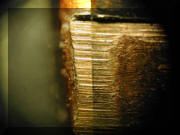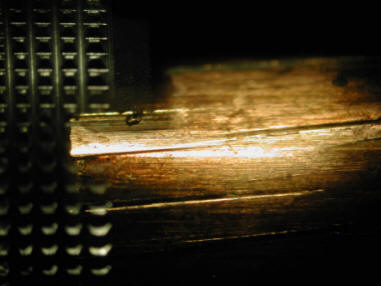Product Review
Leica
FS C Forensic Comparison Macroscope
by Scott Doyle
|

click image for larger view |
Operation
The field-of-view that you see
when looking into the FS C was very bright and clear. Leica is well know
for making some of the best optics in the world. The FS C will not
disappoint those looking for a comparison scope with high optical quality.
As I looked at the bullets
through the FS C I started playing around with control module to see what it
could do. In addition to the stage movement controls all modifications to
the field-of-view are controlled by several buttons and knobs on the top of the control
module. Below is an illustration showing the various controls.

The centerline in a comparison macroscope
is a very important feature. It allows you to vary the size of the
field-of-view for each stage image. The FS C does everything possible with
four buttons and two knobs. Normal view is accomplished by pushing the
"LR" button. This splits the field-of-view evenly between the two stages.
Pushing the "L" or "R" buttons causes a motor to gently move the centerline
either all the way to the left or right. The mix button
causes the left and right images to overlay on top of each other. The
centerline can be manually moved left and right and the amount of overlay can be
manually set with the two knobs.

The image above shows the left and right
images in the "Mix" mode. Notice no well defined centerline? That's
because there isn't one. Since I've never had a comparison scope that does
this I'm not sure what I will use it for but I suspect it will be good for
comparing impressed breech marks.
**Edited
11/20/03** See here!
 To be fair, my FS C has not yet been
inspected by a representative of Leica and I'm hoping that a technician can get
this corrected. I hope so! To be fair, my FS C has not yet been
inspected by a representative of Leica and I'm hoping that a technician can get
this corrected. I hope so!
Image calibration is another easy task
with the optical bridge. Located on the right side of the optical bridge
is a knob that adjusts the calibration between the two images. A LED
located on the front of the bridge glows green when the two sides are calibrated
and red when out of calibration. This knob actually allows you to increase
the magnification of the right image slightly if need be.
The last adjustment to the image
field-of-view is a single button labeled 1.5x on the top of the control module.
Pushing this button increases the magnification factor by 1.5x bringing the 4x to
6x, 10x to 15x, 20x to 30x, and 40x to 60x. It's a very nice feature that
can be turned on and off with the push of a single button.
Next-Conclusions
|